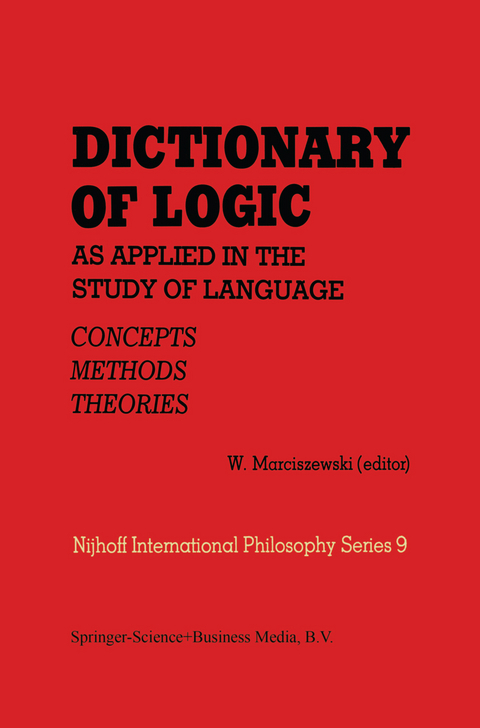
Dictionary of Logic as Applied in the Study of Language
Springer (Verlag)
978-90-481-8257-2 (ISBN)
1. STRUCTURE AND REFERENCES 1.1. The main part of the dictionary consists of alphabetically arranged articles concerned with basic logical theories and some other selected topics. Within each article a set of concepts is defined in their mutual relations. This way of defining concepts in the context of a theory provides better understand ing of ideas than that provided by isolated short defmitions. A disadvantage of this method is that it takes more time to look something up inside an extensive article. To reduce this disadvantage the following measures have been adopted. Each article is divided into numbered sections, the numbers, in boldface type, being addresses to which we refer. Those sections of larger articles which are divided at the first level, i.e. numbered with single numerals, have titles. Main sections are further subdivided, the subsections being numbered by numerals added to the main section number, e.g. I, 1.1, 1.2, ... , 1.1.1, 1.1.2, and so on. A comprehensive subject index is supplied together with a glossary. The aim of the latter is to provide, if possible, short defmitions which sometimes may prove sufficient. As to the use of the glossary, see the comment preceding it.
Abstraction operator.- Algebraic structures.- Algorithms.- Analyticity.- Antinomies.- Arithmetic.- Automata.- Automata, finite.- Categorial grammar.- Classes, theory of.- Combinatory logic.- Completeness.- Computability abstract theory.- Consequence.- Consistency.- Counterexample, the method of.- Decidability.- Deduction theorem.- Deductive method.- Definability.- Definition.- Deontic logic.- Description, definite.- Dialogic logic.- Dot notation.- Duality.- Elementary theory.- Entailment and relevance.- Extension.- Formalization.- Gödel’s theorem.- Grammar, formal.- Independence.- Intension.- Intuitionistic logic.- Lambda-operator.- Legniewski’s systems.- Logical form.- Logic, modern, history of.- Many-valued logic.- Mappings.- Meaning.- Modality.- Modal logic.- Modal semantics.- Model theory.- Name.- Natural deduction.- Normal form.- Polish notation.- Pragmatics, logical.- Predicate logic.- Probability.- Programming languages.- Quantifiers.- Questions.- Recursive functions.- Relations, theory of.- Semantics, logical.- Sentence.- Sentence logic.- Sequent calculus.- Sets, infinite.- Sets, ordered.- Set theory, axiomatizations of.- Syntax, logical.- Tense logic.- Topology.- Trees.- Truth.- Truth-table method.- Types, theory of.- General bibliography.- Subject index and glossary.- Index of symbols.
| Erscheint lt. Verlag | 30.12.2010 |
|---|---|
| Reihe/Serie | Melbourne International Philosophy Series ; 9 |
| Zusatzinfo | XIV, 436 p. |
| Verlagsort | Dordrecht |
| Sprache | englisch |
| Maße | 155 x 235 mm |
| Themenwelt | Geisteswissenschaften ► Philosophie ► Allgemeines / Lexika |
| Geisteswissenschaften ► Philosophie ► Logik | |
| Geisteswissenschaften ► Philosophie ► Sprachphilosophie | |
| ISBN-10 | 90-481-8257-3 / 9048182573 |
| ISBN-13 | 978-90-481-8257-2 / 9789048182572 |
| Zustand | Neuware |
| Haben Sie eine Frage zum Produkt? |
aus dem Bereich


